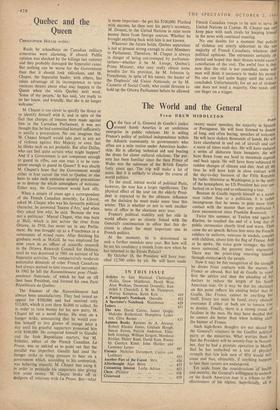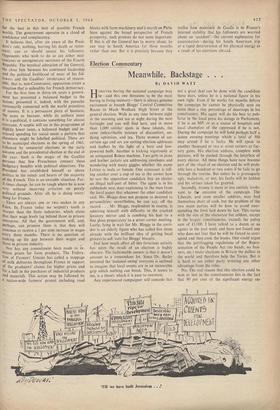The World and the General
From DREW
MIDDLETON
ON the face of it, General de Gaulle's junket around South America is an ambitious enterprise in public relations. He is selling France's policy of political independence within the Atlantic community to governments who often are a mite restive under American leader- ship. He is offering technical aid and beating the drum for closer cultural relations. The pat- tern has been familiar since the then Prince of Wales was the salesman of the British Empire forty years ago. The trip will make a lot of noise. But it is unlikely to change the course of world politics.
To the small, inbred world of political Paris, however, the tour has a larger significance. The physical effect of the tour on the elderly Presi- dent is expected .to be the ultimate influence on the decision he must make some time this winter. This is whether or not to seek another term of office in the elections next year.
France's political stability and her role in world affairs are so closely linked with the General's continuation in office that this de- cision is about the most important one in French politics.
At the moment, he is determined to seek a further mandate next year. But how will he see his candidacy a month from now when he has returned to the Elysee Palace?
By October 16, the President will have trav- elled 12,500 miles by air. He will have made
twenty major speeches, the majority in Spanish or Portuguese. He will have listened to dozens of long, and often boring, speeches of welcome, He will have shaken thousands of hands. He will have clambered in and out of aircraft and cars a score of times each day. He will have endured a series of elaborate State banquets. He will have flown from sea level to mountain capitals and back again. He will have been subjected to sudden changes of climate and diet. And all the time he will have kept in close contact with the day-to-day business of the Fifth Republic by radio. Attentive as Washington Is to the unity of the hemisphere, no US President has ever em- barked on so long and so exhausting a tour.
Because de Gaulle regards himself as a states- man rather than as a politician, it is rather incongruous that he seems to gain more from contact with the masses than any politician I have encountered since Franklin Roosevelt.
Twice this summer, at Toulon and again at Rheims, he reached the end of a long day of public ceremonies clearly tired and worn. Then came the set speech. Before him were the French, soldiers in uniform, veterans in medals, couple with children, above him the flag of France. And as he spoke, the voice grew stronger, the face more animated, the gestures more expressive. There was the priest-king renewing himself through contact‘vith the people. Now it may be this recognition of the strength he draws from contacts with the masses, in France or abroad, that led de Gaulle to reject first the advice and then the pleading of his doctors to reduce the length of his South American tour. Or it may be that his obstinacy on this point reflects his abiding belief that de Gaulle, like France, cannot be anything but itself. Every test must be faced, every obstacle overcome if either or both are to remain true to destiny. Finally, there is a strong streak of fatalism in the man. He may have decided that he cannot die better than when holding aloft the banner of France.
Such high-flown thoughts are not shared by the General's retainers in the Gaullist political party or the ministries. What worries them is that the President will be seventy-four in Novem- ber, that he had a prostate operation in March, that he has embarked on a test of physical strength that few hale men of fifty would wel- come and that, ultimately, if anything happens to him their careers are endangered. Yet aside from the considerations of health and security, the General's willingness to embark on the South American tour is a tribute to the effectiveness of his regime. Superficially, all is
for the best in this best of possible French worlds. The government operates in a cloud of confidence and complacency.
It believes that, after six years of the Presi- dent's rule, nothing, barring his death or retire- ment, can or should unseat his followers. Opponents who wish to do so are either mal- contents or unregenerate survivors of the Fourth Republic. The mystical adoration of the General, the close link between his continued leadership and the political livelihood of most of his fol- lowers and the Gaullists' intolerance of reason- able, that is, non-Communist, opposition create a situation that is unhealthy for French democracy.
For the first time in thirty-six years a govern- ment has presented a balanced budget to the nation; presented it, indeed, with the panache customarily connected with the world premieres of movies. It is a persuasive piece of business, the more so because, while its authors insist it is a-political, it contains something for almost everyone. A sceptic will see in this programme of slightly lower taxes, a balanced budget and in- creased spending for social needs a pattern that elsewhere might be labelled political. There are to be municipal elections in the spring of 1965, followed by senatorial elections in the early autumn and the presidential election at the end of the year. Such is the magic of the Gaullist Persona that few Frenchmen connect these budgetary benefits with political objectives. The President has established himself as above Politics in the minds and hearts of the majority of the French. This is an enviable situation. For, if times change, he can be tough where he is now easy without incurring criticism on purely Political grounds. After all, he is doing every- thing for France.
There are always one or two snakes in any Eden. In_ France today no serpent's tooth is sharper than the State industries, which claim that their wage levels lag behind those in private enterprise. All that the government will, and, Perhaps, can promise them is that they will continue to receive a 1 per cent increase in wages every three months. There is no question of making up the gap between their wages and those in private industry.
Nor has any commitment been made to in- crease prices for farm products. The Federa- tion of Farmers' Unions has called a stoppage of milk deliveries throughout France in support of the producers' claims for higher prices and for a halt in the purchases of industrial products and materials. This action may be followed by a nation-wide farmers' protest including road
blocks with farm machinery and a march on Paris. Seen against the broad perspective of French prosperity, such protests do not seem important. If this is all the General has to worry about, he can stay in South America for three months rather than one. But it is precisely because they realise how necessary de Gaulle is to France's internal stability that his followers are worried about an 'accident'—the current euphemism for assassination—during his South American trip or a rapid deterioration of his physical energy as a result of his exertions abroad.















































 Previous page
Previous page